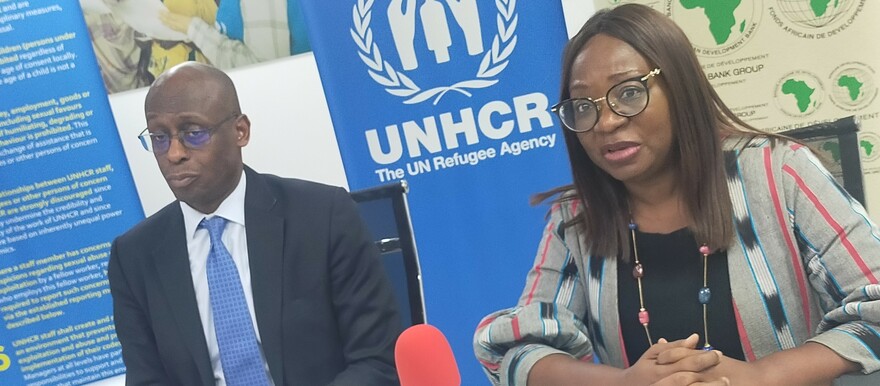The Vice President for Regional Development, Integration, and Program Delivery at the African Development Bank announced on Wednesday that they are working in partnership with the United Nations High Commissioner for Refugees (UNHCR) to offer comprehensive solutions for the development and lasting support of refugees and returnees displaced from Sudan.
Marie Laure Akin Olugbade arrived in South Sudan for a two-day official visit on Monday. During her visit, she assessed the humanitarian situation in camps for returnees and refugees, engaging in high-level discussions with South Sudan’s First Vice President, Dr. Riek Machar Teny. The discussions aimed to identify opportunities for fruitful collaboration.
Speaking at a news conference held at the UNHCR’s office in Juba, Laure emphasized their joint efforts to find synergies and enhance support for displaced individuals amid the heightened conflict on the continent and in South Sudan.
She highlighted the uncommon collaboration between a development bank and a UN agency focused on humanitarian assistance for forcibly displaced individuals. Laure expressed the institution’s commitment to exploring avenues for bringing both development and lasting solutions within a humanitarian context.
“We, as a development bank, and UNHCR, as a UN agency specializing in humanitarian assistance for the forcibly displaced, do not often collaborate. However, this is certainly something that we would like to do more. We have already begun exploring ways to provide comprehensive support to displaced people,” Laure conveyed to journalists in Juba, the capital of South Sudan.
Laure explained that her visit to South Sudan aimed not only to engage with the country’s authorities but also to inspect projects implemented with the support of the African Development Bank Group. Additionally, she sought to foster collaboration with other partners to ensure the most effective support for South Sudan and its people.
“We exchanged views on the quality and implementation of activities that the African Development Bank is supporting the government with. These activities span various sectors, including agriculture, skills and technical vocational training, energy, transport, governance, and financial management. The portfolio amounts to about $160 million and is being implemented satisfactorily,” Laure clarified.
Laure also mentioned that she had the opportunity to discuss the future support cycle that the bank could provide to South Sudan. She emphasized that their priority areas include agriculture, food security, transport, energy, as well as skills, technical, and vocational training.
Raouf Mazou, UNHCR’s Assistant High Commissioner for Operation, highlighted that South Sudan has been significantly affected by forced displacement, even predating the crisis in Sudan. He pointed out that, before the conflict, South Sudan received over 300,000 refugees primarily from Sudan. Since mid-April of the previous year, the country has witnessed the return of about 400,000 South Sudanese and over 100,000 Sudanese refugees. He cautioned that these numbers might double.
Mazou emphasized the importance of collaboration with the AfDB, not just to settle the displaced persons but to provide sustainable solutions. He stated, “The support needed by the returning people goes beyond initial humanitarian aid. It involves rebuilding their lives. This is where the African Development Bank’s comparative advantage lies, ensuring that the government, in its future planning, incorporates and integrates all those who have returned due to the situation in Sudan, whether Sudanese refugees or South Sudanese returning.”




